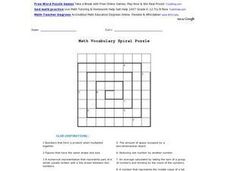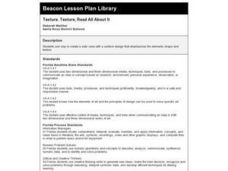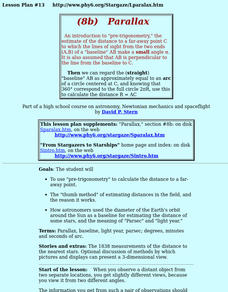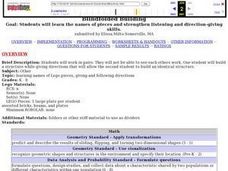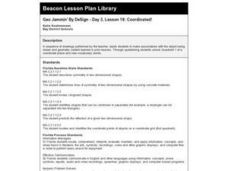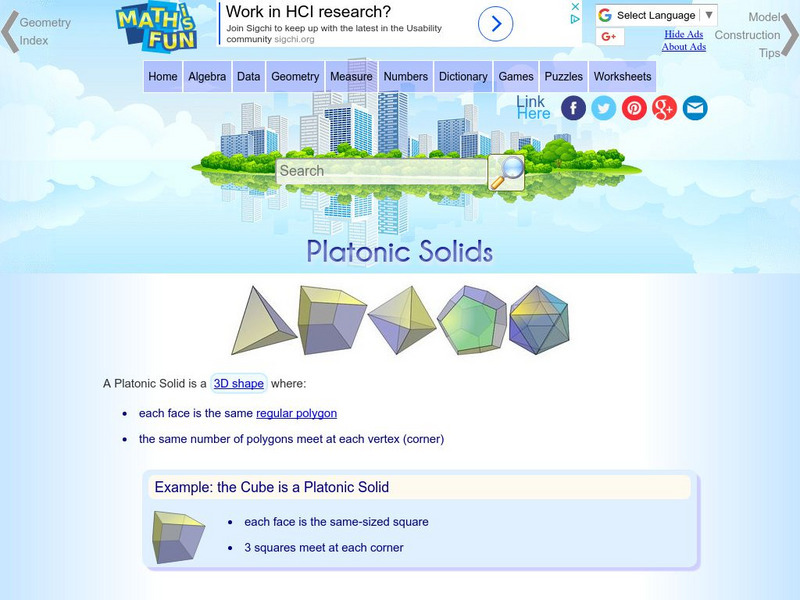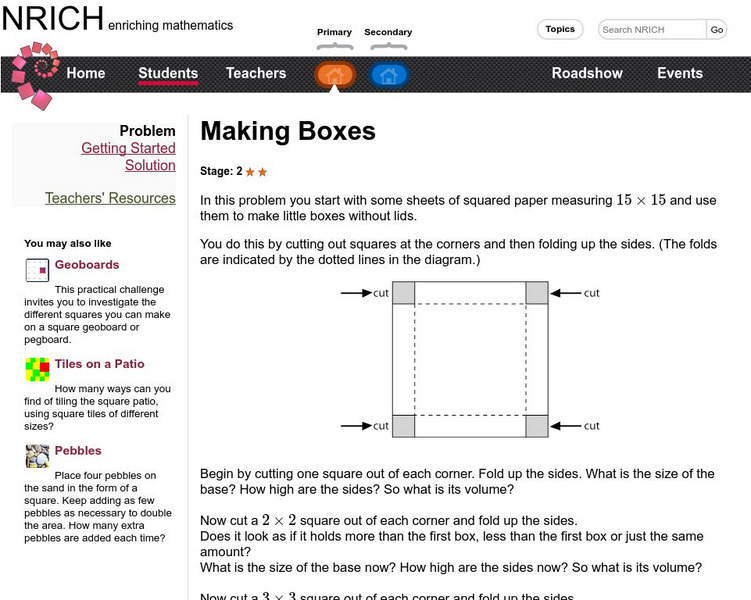Curated OER
Math Vocabulary Spiral Puzzle
In this math vocabulary instructional activity, students solve the clues for math vocabulary words to fill in the blanks in a crossword. Students complete 8 problems.
Curated OER
Texture, Texture, Read All About It
Fourth graders use clay to create a slab vase with a surface design that emphasizes the elements shape and texture. They complete a self-evaluation of their project which is imbedded in this plan.
Curated OER
Inscribed Angles
Students analyze inscribed angles and intercepted arcs and explore the relationships between the two. They investigate the properties of angles, arcs, chords, tangents, and secants to solve problems involving circles.
Curated OER
Mobile-ize
Second graders, using a minimum of four space figures, create a mobile. They use a "Draw" program to first plan out their figure.
Curated OER
Still-Life Painting: Arranging Nature
Students examine and discuss still-life paintings and develop a definition for the genre. They paint their own still life paintings from direct observation.
Curated OER
Present Hunt
In this game students move around a game board by spinning a spinner and moving to the next place on the board whose shape matches the one they spun.
Curated OER
Introduction to Plates, Axles, and Gears
Pupils are introduced to the function and design of the following Lego pieces: beams, bricks, plates, axles, tires, hubs and bushings. They then work with a partner to build something using only these pieces.
Curated OER
Parallax
Pupils discover how astronomers used the diameter of the Earth's orbit around the Sun as a baseline for estimating the distance of some stars, and the meaning of "Parsec" and "light year."
Curated OER
Relationships and Functions
Fifth graders describe patterns as relations and functions. In this patterning lesson, 5th graders analyze and continue patterns. Students understand how patterns relate to relations and functions.
Curated OER
Compare 2-D Shapes
Second graders explore and analyze plane shapes. For this plane shapes lesson, 2nd graders evaluate shape attributes to classify shapes correctly. Students work in groups to create different shapes.
Curated OER
How Large is a Mole of M&M's
Students calculate whether or not a mole of M&M's fill their high school. They practice factor-labeling, define a mole, and calculate the number of cubic feet per mole of M&M's. To answer the question they measure and calculate...
Curated OER
Blindfolded Building
Pupils build a Lego design and then work with a partner to reproduce that design. They guide the building of the reproduction by description only and then check their work.
Curated OER
Our Geometric World
Third graders explore the attributes of polygons. In this geometric shapes lesson plan, 3rd graders review quadrilaterals, squares, rectangles, triangles, pentagons, hexagons, and octagons in order to create hanging polygons. Students...
Curated OER
Pythagorean Theorem: Triangles and Their Sides
Students investigate triangles and their relationship to each other. In this geometry lesson, students solve right triangles using the properties of the Pythagorean Theorem. They differentiate between right, acute, straight and oblique...
Curated OER
Geo Jammin By Design: Coordinated
Learners watch the teacher draw on the chalkboard and try to determine the form being drawn. They use questions to determine Quadrant #1 of a coordinate plane.
Curated OER
Physics Rewind
Eighth graders differentiate speed and velocity. In this physics lesson plan, 8th graders explain Newton's laws of motion. They calculate speed using a mathematical formula.
Curated OER
Assignment: Creating within a Limited Format
Students follow set of guidelines to create a picture of an apple with a stem and leaf. They think about whether they are more or less creative when working within a set of rules.
Technovation
Curiosity Machine: Challenges: Make Drawings of Three Dimensional Objects
Using the Glass Box Theory, students will make scaled technical drawings of 3D objects. This site includes the challenge, tips, a lesson plan, and a place for students to document their engineering design process.
Math Is Fun
Math Is Fun: Making 3 D Solids
This tutorial features templates and instructions to make the following solids: tetrahedron, cube, octahedron, dodecahedron, and icosahedron.
University of Cambridge
University of Cambridge: Nrich: Making Boxes
Have fun and learn by making a box and then find out its maximum volume as well as other problem-solving activities, including making a table of your results and drawing a graph.
University of Cambridge
University of Cambridge: Nrich: Making Cuboids
How many different cuboids can you make? Learn how and learn how to represent data with your results.
University of Cambridge
University of Cambridge: Nrich: Three Cubed
Use the shapes provided and figure out how they fit together to make a 3 X 3 cube at this one page website. The solution is readily available right at the website.
Texas Instruments
Texas Instruments: Copying an Angle
Explore relationships (including congruence and similarity) among classes of two- and three-dimensional geometric objects, make and test conjectures about them, and solve problems involving them.
National Council of Teachers of Mathematics
Nctm: Illuminations: Volume of a Cube
"The volume of a cube can be developed by considering unit cubes, a single row (longs) of unit cubes or a single layer (flats) of cubes using this applet." This easy software makes it possible to easily construct a cube and take it...
